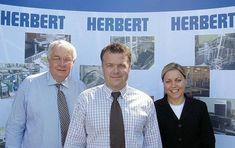
Joint managing director Nick Herbert has strong views on the future of RJ Herbert Engineering and its role within the potato industry.
He believes it is the customers’ own strategic plans, rationalisation within the supply chain and changing regulations that will shape the direction of the sector in the coming years. Supporting his son’s directorship is company founder, Rod Herbert, who with experience in design and manufacturing provides high level guidance for the company. His daughter Jo Herbert was recently appointed as the company’s marketing manager and is responsible for its strategic planning has joined the father and son team.
An example of Herbert’s commitment to the changes in the potato sector is the recent joint-relationship established with robotics specialist, Robogo BV, for which Herbert’s provide the system integration facilities.
Based in Eindhoven, Robogo BV manufactures three dimensional robots in three or four axis configurations. The range of grippers includes mechanical or vacuum operations for bag, tray and case handling. According to Herbert, the alliance with Robogo provides an experienced robotics partnership that will help the cost effectiveness and efficiency for fresh potato packing operations in the UK.
“Most in the industry will agree there is no utopia or perfect solution to all the requirements consumers place on the supply chain, but potato growers, machinery manufacturers, fresh packers and processors are doing everything possible to achieve the results the industry demands,” says Jo Herbert.
The next generation of machines is being developed in close collaboration with key customers in all sectors of the potato industry. Jo Herbert says: “The main factor influencing system design is increased performance and reliability, working conditions, labour supply and our customers response to retailer demands.”
Looking back over the last 18 months, she adds it is easy to identify why these factors have become more and more important. “Our customers are trying to respond to the higher demands from the multiple retailers, which includes the need to offer lower cost of production in an increasingly time sensitive environment and maintaining the highest levels of hygiene.”
According to Herbert, there have been a number of significant changes that have taken place in potato fresh packing. These include: packaging changes driven by the move from wicketed bags to vertical form fill and seal; labour costs and ongoing requirements for social and pension provisions; manual lifting regulations being enforced; litigation risk becoming more prevalent with the onset of increased claims for repetitive strain injuries; environmental constraints such as atmosphere pollution, noise levels and waste management; more training to ensure staff competence and safety; and a reduction in staff numbers.
“The changes have resulted in major overhauls of existing packhouses that has had knock on effects through the handling process,” says Jo Herbert.
“An example of this is the change to new generation weighing and packing machines to meet retailer requirements for fast and high volume packaging. The direct results of the new technology has been increased packing rates and the need to automate the end of lines to handle the higher capacity output. Herbert Engineering have designed greater capacity washers, installed holding bins and provided robotic solutions to cope with the demands of these faster throughputs.
“Automation is fundamental to the reduction of repetitive strain claims and injury by manual handling. Coupled with this are the advantages of reduced labour and consistency of production. Recent successful projects include pick and place robotics, a fully automatic tray de-nesting, distribution, filling and restacking installation and a bulk box tagged rolling road system which reduces the requirement for excessive forklift activity and also aids full traceability of product.”
The marketing manager has noticed that purchasing trends have meant more customers requesting their entire lines in stainless steel due to advantages in hygiene and durability. “Supermarkets seem to view hygiene, contamination and litigation risk as increasingly prominent issues. This has led to the company developing improved destoning techniques and floating debris removal systems to minimise risk of stone or wood throughout the handling process.”
The team at Herbert’s is aware that professional growers are working hard to provide the varieties and the skin finish required by retailers today, therefore are establishing strong links with packers to maintain a continuity of supply for the coming years.
Sales manager Andy Hubble sums it up: “As a company we have moved with the industry and at times driven technology changes with our forward approach to research and development. Full support and services is now key to maintaining these customer relationships. Therefore we have invested to ensure we provide first class services that include design consultancy, project management, service maintenance programmes, product support and practical training to name but a few.”
The next generations - both management and machines - are prepared to handle the future and changes in the potato sector.